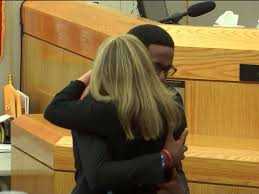Back in 2017 I wrote a piece on forgiveness and how it’s often couched in the sentiment of self-help, in contrast to forgiveness being an act we choose to do because it’s God’s will. My focus on that piece was to challenge our thinking on forgiveness, so that we remember the true foundation and reason we as Christians are to forgive.
In light of this week’s sentencing of Amber Guyger for the crime she committed by killing Botham and the forgiveness extended to her by Botham’s brother Brandt in the courtroom this week, I deeply wanted to address the topic of forgiveness in another light.

Whenever there’s a situation that involves a victim forgiving an offender, specifically blacks in America, there’s an immediate backlash in response to it. This makes sense, especially in light of the fact that the sentence of the crime either doesn’t fit or the disparity in sentencing between whites and blacks are obvious. The sentencing of Amber Guyger is no different, because she received a ten year sentence for last year’s murder of Botham, and many have argued that blacks would’ve been given a longer one. Even the family felt that the sentence was too light.
Another thing that’s attacked is the act of forgiveness that Brandt offered Amber and that he hugged her after. Forgiveness is seen as an act of weakness that absolves the offender from the justice they deserve. That narrative is also applied to blacks who offer forgiveness to white offenders, and is given as one reason for continued white supremacy and the way they’re let “off the hook” for what they’ve done.

I think that it is beautiful that Brandt did not offer hatred in light of her racially offensive text messages shown in court. Even more, I’m grateful to know that Christ and the salvation he provides was declared publicly to her. However, in light of that goodness, I want to highlight what forgiveness actually is, and how we often miss the meaning of forgiveness in these situations.
What is Forgiveness?
To give more context to what led me to write this, I was reading up on forgiveness in light of the passionate discussions on social media. I ultimately came across this article on GotQuestions.org titled Since God witholds forgiveness, can we? This article outlines the biblical definition of forgiveness, and I’ll quote some of it below:
“Biblically, full forgiveness is not just something that the offended person offers; it requires that the offender receives it, bringing reconciliation to the relationship.”
Article: Since God witholds forgiveness, can we?
With the subject of forgiveness there’s either the focus on how much forgiveness helps you to heal, or it’s focused on forgiveness happening because someone offered it. As much as God’s forgiveness is wrapped up in us receiving it ourselves, we often believe forgiveness is the offer of it from someone, and we don’t consider that if someone is unrepentant and rejects the offer that they’re not forgiven. This is why God can offer forgiveness, yet those who reject this offer spend eternity separated from Him in hell, and this still be an act of deep love from God.
Now, this doesn’t mean that God is pleased with us walking around with unforgiveness against anyone. Jesus asked God the Father on the cross to forgive those who crucified him, whether or not they accepted it. But what this does mean is that forgiveness takes two people or parties to occur. None of the people Jesus forgave would’ve been forgiven if they did not repent. In my opinion, this changes the way we look at forgiveness in light of justice and the offense.
If you’ve ever been hurt by someone who won’t repent, you have to leave the justice up to the Lord, because vengeance belongs to Him. As long as you do not wish evil upon someone, it’s good to acknowledge to the Lord that you’ve been violated, and that this is not good. You are not required to act as if there’s reconciliation when you offer forgiveness. But if the offender repents and asks for your forgiveness, then you must forgive in light of the fact that you’ve been forgiven first.

This act by Brandt to offer forgiveness to Amber is complex in that it involves a real lack of justice in the sentencing, along with the loving offer of forgiveness in light of Amber’s apology to the family. We must all engage these realities together, and we shouldn’t diminish the nuances that exist in these circumstances.
It will continue to be popular in the world and the church to associate forgiveness with self-love and the healing of oneself, and I believe that this really diverts the attention from the true reality of forgiveness. Along with the idea that forgiveness can happen without the offender being repentant and confessing what they’ve done, it reduces the full force of forgiveness by removing the need for repentance and confession. But if we can remember the forgiveness that the Father offers us in light of Christ’s death, we too can be like our Father and forgive one another.
Categories: Bible, Current Events, Racism, reflection


